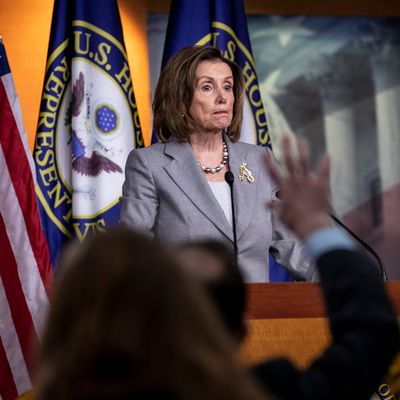
Amid a wild and crazy Election Night, one trend that many observers who were fixated on the presidential and Senate contests may have missed is that expected Democratic gains in the U.S. House emphatically did not occur. Au contraire, as Roll Call reported:
With more than 50 races still uncalled as of early Wednesday afternoon, House Democrats hoping to grow their majority had failed to defeat a single Republican incumbent, while they lost a handful of seats in Trump-friendly districts and two in a part of Florida considered central to President Donald Trump’s victory in the state.
As I noted earlier this week, there was a consensus expectation among professional House-watchers that Nancy Pelosi’s team would add between 10 and 20 net seats, in part because of large-scale Republican retirements. The Cook Political Report’s David Wasserman, who was one of those surprised wizards, suggested the results could go pretty hard the opposite way:
Wasserman explained what happened in a bit more detail elsewhere:
The suburban anti-Trump revolt that took 2018 by storm didn’t extend to 2020. Most Republican incumbents in white-collar suburbs didn’t just survive, they thrived — running well ahead of President Trump down-ballot. It may have helped that unlike 2018, when those voters’ only opportunity to express displeasure with Trump was in congressional races, they were able to split their tickets this year….
The races where Republicans most vastly outperformed everyone’s priors were heavily Hispanic districts that swung enormously to Trump. These include both GOP pickups in Miami (Carlos Gimenez in FL-26 and Maria Elvira Salazar in FL-27) as well as Republican Tony Gonzales’s hold of Rep. Will Hurd’s open TX-23. Amazingly, Republicans didn’t lose a single seat in Texas.
Nobody’s talking about Republicans actually flipping the House itself; thanks to its 2018 wave, Democrats had a 235-199 advantage going into the election. But Pelosi’s margin for error will be significantly diminished. And worse yet for her, there’s another babbling brook of discontent with her in the Democratic ranks, particularly among the self-identified “centrists” who momentarily threatened her position in 2018, as The Hill reports:
Stung by their party’s disappointing showing at the polls Tuesday, two moderate House Democrats say they and other centrists are privately discussing a plan that was unthinkable just 24 hours earlier: throwing their support behind a challenger to Speaker Nancy Pelosi (D-Calif.).
The two Democrats told The Hill on Wednesday that they were reaching out to their colleagues about backing one of Pelosi’s top lieutenants, House Democratic Caucus Chairman Hakeem Jeffries (N.Y.), for Speaker.
When the “centrists” came after her before, Pelosi shored up her position by promising to step down as Speaker in 2022 if Democrats retained control of the House. But there may be some pressure for her to speed up her planned exit.
As Politico explains, the “centrist” claim that Pelosi gave too much influence to progressives is by no means the only intraparty theory being offered for the terrible election outcome:
Others argued that the DCCC had been far too bullish in seats the party was realistically never going to pick up — citing races such as Arkansas’ 2nd District — while missing the looming disaster in South Florida, where incumbents Shalala and Rep. Debbie Mucarsel-Powell were ousted. Several Democrats said the party operation was not focused on a cohesive, proactive message that went beyond simply opposing Trump, who proved to remain popular in many districts.
And some said DCCC wasted time battling the party’s left flank with its contentious policies designed to stymie primary challengers.
The defeat of a few Democratic incumbents in deep-red territory (e.g., Collin Peterson of Minnesota, Xochitl Torres Small of New Mexico, and Kendra Horn of Oklahoma) was unsurprising. But Texas really was a shock:
Texas was a massive disappointment for Democrats, who invested millions in targeting 10 seats and even opened a satellite DCCC office in Austin. They failed to flip the massive West Texas seat held by retiring GOP Rep. Will Hurd — a district that Hillary Clinton carried in 2016.
Assuming Joe Biden wins the presidency, as seems very likely now, House Democrats will have to face the strong possibility of the usual midterm backlash against the party controlling the White House. With or without Pelosi at the helm, the smiles they have exhibited since the last midterms are beginning to turn upside down.






























